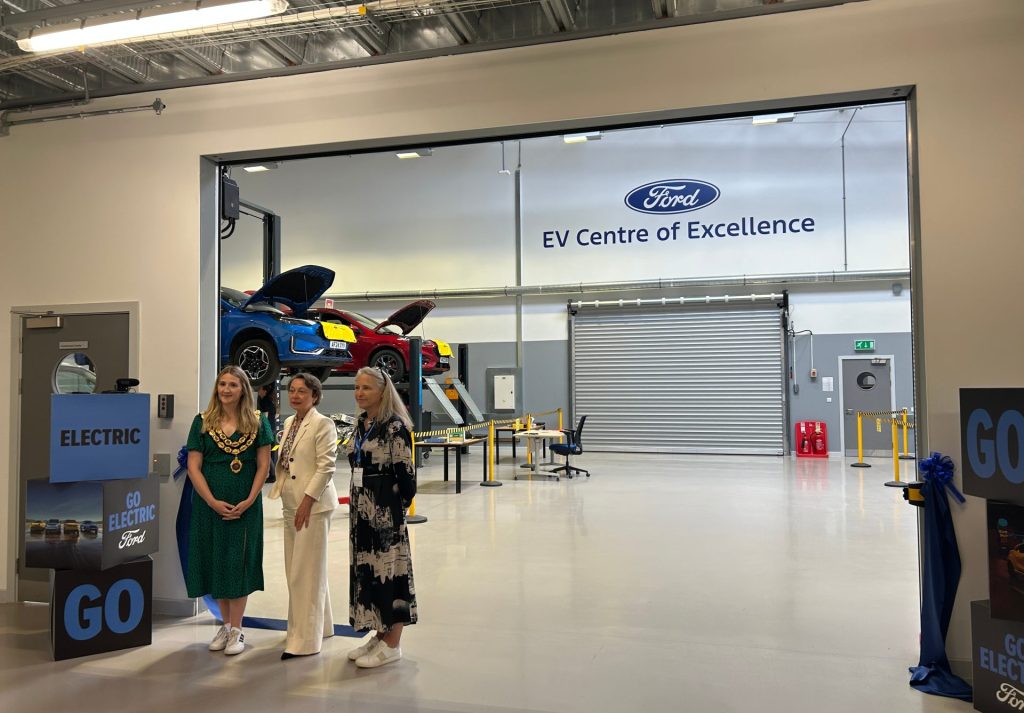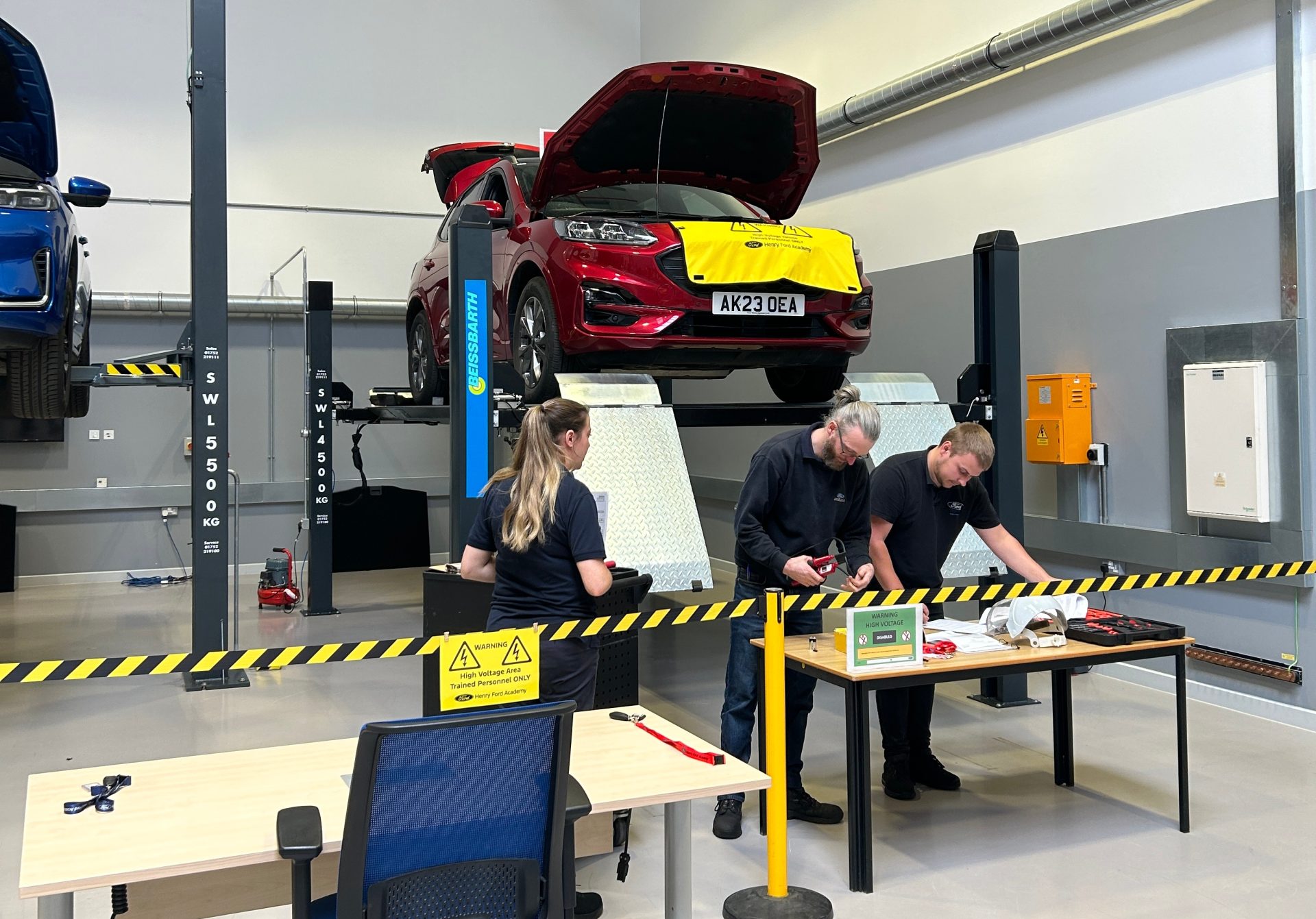On Wednesday 25 June, the Henry Ford Academy in Daventry celebrated a ten-year milestone of educating apprentices and building a resilient, skilled automotive workforce. To mark the occasion Ford opened the doors to the automotive industry, press and local school children to showcase the centre’ capabilities.
In 1912, Ford opened its first training centre and now, over 100 years later, is still growing and expanding its training facilities to be the heart of the Ford network.
Lisa Brankin, Managing Director at Ford UK & Ireland said the decade-long milestone was a time for reflection on the achievements made over the years at the training centre. “We have had over 1,500 apprentices train here who have moved into the network, creating an outstanding legacy. We have also awarded 2,500+ EV qualifications to apprentices and others to be able to service and maintain our electric and hybrid vehicle ranges.”
EV Centre for Excellence
On the day, Lisa Brankin, Managing Director at Ford UK & Ireland, Ann Cardus, Dealer Training Manager at Ford Motor Company and Daventry Town Mayor, Katie Thurston, opened the new EV Centre of Excellence at the facility. The new centre highlights Ford’s commitment to the electrification of vehicles, the 2035 goal of no longer producing diesel vehicles within the UK and being able to service its smart cars by smart people.
Heart of the whole network
During the day, I sat down with Lisa and Ann to discuss the importance of The Henry Ford Centre, its impact and the future of the automotive sector.
Looking back on the past decade, what are you most proud of when it comes to the impact the Henry Ford Academy has had on apprentices and the automotive industry?
LB: The biggest achievement is the number of people whose careers the academy has touched. Reflecting on the training we’ve undertaken here and the number of technicians and apprentices that have come through the academy, it’s huge. But it’s not all skills-based, we’ve also helped people with their professional training as well.
I often meet people in the network who will tell me they took one of our leadership courses here and how much it helped them develop.
AC: Almost everybody that you come across in the dealer network will have had an interaction with The Henry Ford Academy and it will have helped them in some way in their career. It’s great to see progress within people because of an intervention that we’ve had.
The automotive sector is undergoing a rapid transformation, with electrification, digitalisation and automation of the workforce. How is the academy adapting its training to prepare apprenticeships for this?
AC: Several years ago, we introduced the EV qualification on all our apprenticeship courses; this ensures that when they have completed the apprenticeship they emerge as a qualified Ford technician and a qualified Ford EV technician. It prepares them to be fully operational in a dealership, both on internal combustion engines and on electric vehicles, in terms of the technology that they use.
We are also using cloud diagnostics with embedded modems to help diagnose issues effectively before a vehicle comes into a workshop. This is now part of the training that we deliver. We must also deliver the training for any new innovations and technologies that are on the vehicles.
A big misconception is that people often associate electric vehicle training with full battery electric vehicles, but that training is also essential for hybrids – plug in or full. You still need that level of capability.
LB: We are the first point of contact when something new is introduced and the trainers must be fully up to speed with it to be able to deliver it to the apprentices. From the point where it gets introduced, we begin including it in training curriculums. Before it ripples through the network, it starts at the academy.
Looking at the current UK automotive workforce, what is the biggest challenge to address right now?
LB: The biggest challenge as an industry overall is attracting people to come to work in automotive. A VP of personal development once said, the problem with the car industry is it’s not sexy and interesting. People watch programmes about lawyers or doctors, but they don’t watch programmes about engineers. We need to be working hard to encourage people to consider the automotive industry as a career.
Most businesses are happy to hire people in and train for skills, which is what the academy does. You need people who want to come into the business, whether it be in a manufacturing plant, a workshop or a sales site and then you can train them with the skills for the workforce.
With the introduction of new technologies, the skill set required is more akin to the younger generations with areas they are more interested in. We need to get that message across that the industry does not conform to the often held stereotypes.
We have a responsibility to change perceptions and we do that by reaching out to schools and colleges and educating them that the picture of the industry from 50 years ago, isn’t the same as today.
How is the academy helping to spark early interest in STEM?
AC: The apprenticeship scheme has a programme of how it reaches out to schools and colleges – not just locally, but nationwide – to talk to them about the automotive sector and what a career could look like in the dealership world.
LB: Many of our dealerships have their own outreach programmes. We work on a national basis, but many individual dealerships will have their own relationships with local schools and academies. They offer work placement, shadowing and a chance for young people to see what it might be like to come and work in a leadership business.
What role do you see apprenticeships and The Henry Ford Academy playing in building a resilient future ready, automotive workforce over another decade?
AC: I see the apprentice programme growing and continuing to be a constant feed into dealerships of fresh, new talent. Those who come through our apprenticeship programmes tend to stay with the business, providing stability to the dealerships, the business and the apprentice themselves.
Degree apprenticeships have also grown and the word ‘apprenticeship’ is no longer something that people disregard. It is actively being sought by young people, which is a positive thing. The more companies that take on apprentices, the better.
For more articles like this, visit our People & Skills channel.



